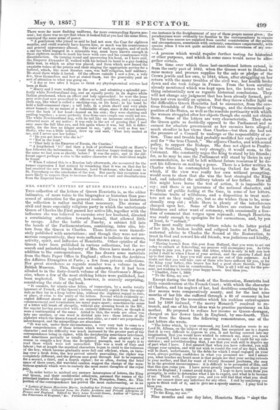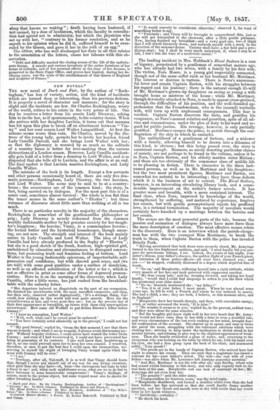MRS. GREEN'S LETTERS OP QUEEN HENRIETTA MARIA. * Tnis collection of
the letters of Queen Henrietta is, as the editor intimates, of more value to the biographer or historian than possessed of attraction for the general reader. Even to an historian the collection is rather useful than necessary. The storms of civil and more especially religious party in which the unfortunate Queen of Charles the First passed her active life, together with the influence she was believed to exercise over her husband, directed a scrutinizing attention towards herself, that allowed little to escape. After the battle of Newby, a cabinet fell into the hands of the Parliamentarians, containing, inter alio., letters from the Queen to Charles. Those letters were immediately published with annotations ; and though they were not numerous comparatively, they were sufficient to indicate the animus, activity, spirit, and influence of Henrietta. Other epistles of the Queen have been published in various collections, but the research and painstaking industry of Mrs. Green have made a great addition to the correspondence. She has drawn some materials from the State Paper Office in England ; others from the Archives des Affaires Etrangeres at Paris ; a few from private collections. Her great storehouse as regards number was a volume in the British Museum. This, though not unknown for it had been alluded to in the forty-fourth volume of the Gentleman's Magazine, where a few of the most striking letters were published, had been neglected. The neglect, however, is scarcely surprising, considering the state of the book.
"It consists, for ninety-nine folios, of transcripts, by a scribe totally ignorant of French, of the Queen's letters, evidently copied from the originals as they lay in a heap before him, without the slightest regard to date, or place, or even to the unity of the letters. Several which evidently occupied different sheets of paper, are separated in the transcripts, and the commencement and termination are many pages apart ; sometimes the sense of a letter will break off abruptly, without any seeming break in the MS., the copyist having proceeded with an entirely different letter, as though it were a continuation of the same. Added to this, the words are often run into one another, or one word is divided into two : those letters of the alphabet which the Queen formed somewhat alike, as v and r are perpetually interchanged, and the misspellings are abundant.
"It was not, under these circumstances, a very easy task to come to a clear comprehension of those letters which were written in the ordinary character ; and the difficulty was much increased by the greater part of the correspondence being in cipher, with the deciphering sometimes interlined, and sometimes partially or totally omitted. The plan adopted was of course to compile a key from the deciphered passages, and to apply it to read those which were left untouched. This was a work of time and labour ; but at length the mystical characters began to yield to the talisman of the key, which became gradually more full and efficient, when, on turning over a fresh folio, the key proved utterly unavailing, the cipher was completely different, and the process once gone through had to be repeated for a second, a third, and a fourth cipher; for so often during the brief space of three years, Aid watchful caution suggest the change of the mysterious symbols which were to embody the most secret thoughts of the royal
pair.
"In order better to mislead any unwary intercepters of letters, the King and Queen and their confidential adherents, assumed the names of the rincipal leaders of the opposite party, as Pym, Hampden, Essex, &e. This portion of the correspondence has proved the most embarrassing, as in no
• Letters of Queen Henrietta Hark, including her Private Correspondence with Charles the First. Collected from the Public Archives and Private Libraries of France and England. Edited by Mary Anne Everett Green, Author of "Lives of the Princesses of England," &e. Published by Bentley. one instance is the decipherment of any of these proper names given ; the pseudonymes were evidently too familiar to the correspondents to require ft. The true names are supplied from careful consideration of the parties and circumstances, sometimes with certainty, sometimes conjecturally, with queries when I was not quite satisfied about the correctness of my conclusion."
—A process which would require further testing for historical or other purposes, and which in some oases would never be altogether certain.
The time over which these last-mentioned letters extend, is from the early part of 1642, when the Queen went to Holland to raise money and procure supplies by the sale or pledge of the Crown jewels and her own, to 1644, when, after struggling on her return with the many troubles of the civil war, her health broke down and she took refuge in France. From the keen scrutiny already mentioned which was kept upon her, the letters tell nothing substantially new as regards historical conclusions. They will not change any judgment that has been already formed, perhaps not even modify an opinion. But they throw a fuller light on the difficulties Queen Henrietta had to encounter, from the cautious friendship of the Prince of Orange, and the determined opposition of the States, as well as the resolute pertinacity with which the woman struggled after her objects though she could not obtain them. Some of the letters are very characteristic. They show the Queen quite as decidedly opposed to the Parliament and as earnest for absolute government as her enemies have alleged ; much steadier in her views than Charles—but then she had not the pressure of a Council to undergo or the responsibility of action. Time and trouble had probably modified her early excess a zeal for "the true Church." She adjures Charles and with sound policy, to support the Bishops. She does not Object to Presbytery in Scotland, though very strongly, it would seem' to the Covenant. She constantly urges the King to stand by his friends ; for, as he may be sure the Parliament will stand by theirs in any accommodation, he will be left without future resources if he desert his followers on making a peace. There is a letter written to Charles when he contemplated leaving Oxford for the West, which, if the view was really her own without prompting, would seem to show that she was the best strategist the King had, and inherited the military talents of her father. How all this might have borne the test of action, it is impossible to say ; and there is an ignorance of the national character, and we think of public feeling at the time, in some of her letters. Feminine traits of wilfulness, and a disposition to treat matters not as they really are, but as she wishes them to be occasionally crop out ; while there is plenty of the interference charged upon her. Some of the letters are curious for their bluntness and utter want of ceremony, with occasionally a freedom of comment that verges upon reproach ; though Henrietta was ready enough -to apologize for her earnestness, and, by pen at least, to "submit."
The most really interesting letters relate to the latter period of her life, in broken health and eclipsed lustre at Pyxis. Her maternal advice to Charles the Second at the Restoration, to trust in God and reward his old friends, was judicious and kindly, but thrown away.
"Having learned from this post from Holland, that you were to set out today: to embark at Scheveling, my prayers will accompany you. As Orby is going to join you, I give him this letter, which is only to tell you bow joyful I shall be when their of your arrival, and the anxiety I shall feel up to that time. I hope you will soon put me out of this suspense. As I doubt not that you will take care of those who have suffered foryou or for the King your father, this bearer has had a good share therein. 'I hope that you will have him in consideration. This is all I will say for the present, not wishing to trouble your happy hours. God bless you.
" Chaillot, June 1, 1660. "To the King, my son."
Except during the first flush of the Restoration, Henrietta had little consideration at the French Court ; with which the character of Charles, and his neglect of her, had doubtless something to do. Her means were comparatively scanty, and for the last nine months of her life she suffered through a fit of economy in_ her son. Pressed by the necessities which his reckless extravagance had by 1668 induced, "the merry Monarch" resolved to retrench, and one of his first ideas was to practise parsimony on his mother. He proposed to reduce her income as Queen-dowager, charged on her dower lands in England, by one-fourth. This drew from the Queen the following remonstrance, one of the last letters she wrote.
"The letter which, by your command, my Lord Arlington wrote to my Lord St. Albans, on the subject of my affairs, has surprised me to a degree that it is very difficult to express to you, it not having entered into my imagination that you would have wished to retrench me, since you knew well yourself, I had come down as near to economy as I could for my subsistence; and notwithstanding that, I see that you wish still to deprive me of part what I have. I feel assured that when you have reflected, you will change your opinion, and will not wish to render the rest of my days, which will be short, unfortunate, by the debts for which I stand engaged on your word, always putting confidence in what you promised me : and I assure you, what touches my heart most is that people see that your saving extends to your mother, and that for want of twenty thousand yaeobuses, she may be in the greatest inconvenience it is difficult to be persuaded of this, and that this sum ruins you. I have never greatly importuned you since your return to England; I cannot avoid doing it. I hope to have news from you promptly, in order to determine what I am to expect, and what is to become of me. Think well I conjure you, and you will find that what you shall do for me cannot draw any inference for any other. I end by conjuring you again to think well of it, and to give me a speedy answer. I pray God to bless you.
"Paris, December 9, 1668. "To the King, my son."
Nine months and one day later, Henrietta Maria "slept the
sleep that knows no waking " ; death having been hastened, if not caused, by a dose of laudanum, which the faculty in consultation had agreed not to administer, but which the physician who sat up with her, "contrary to his former resolution, and as he sa eth to his opinion when he did it, suffered himself to be overruled by the Queen, and gave it her in the yolk of an egg."
The editor, who has well discharged her duty in all that relates to the annotation of the letters, closes her labours with this observation.
"Debt and difficulty marked the closing scenes of the life of the unfortunate Queen. A minute and curious inventory of the entire furniture of her house at Colombe, and of her personal effects at the time of her decease, is preserved in the State Paper Office, and proves how limited, during her declining years, was the scale of the establishment of this Queen of England and daughter of France."



























 Previous page
Previous page